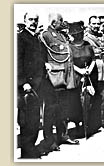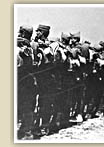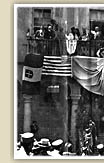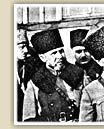|
|
 |
 |
 |
 |
 |
 |
 |
 |
 |
 |
|
Aristeidis Stergiadis
was High Commissioner of Smyrna between 1919 and 1922. He was the 'enigmatic
figure',
|

personally selected by Eleftherios Venizelos for the post, from which even his opponents after the 1920 elections did not remove him.
He himself was hesitant and prevaricated as much as he could in undertaking his duties in 1919.
Only the fervent requests of Venizelos after the bloody incidents of the landing pesuaded him
to show up in Smyrna on 18 May. He did not believe in the feasibility of the campaign, estimating that
the whole operation would result in a harsh war between Greeks and Turks with inestimable
consequences for Greece.
Ever since his arrival his relations with the Greek population were problematic. Determined to
not accept interference in his work either by the eminent of Smyrna, the Metropolis or Athens, he soon displeased everybody devoted to the command
of the Prime Minister for the achievement of a climate of peaceful coexistence
between Greeks and Turks. His stance was interpreted as being biased against them and
favouring the Turks. He frequently had bitter disputes with the military administration concerning the
field of its responsibilities and incensed the inhabitants of Asia Minor.
In the summer of 1922 he was probably the only person aware of the
situation and the imminent Catastrophe. He had made representations to Athens for
the dispatch of ships to carry the Christian populations. When
Catastrophe came about, he was accused of having concealed the truth from
the inhabitants and of not giving them the chance to take measures for their
transport and safety. A few days before the Catastrophe he sent messages
to the local representatives of the High Commission to discourage
the Greeks from leaving after the debacle of the front.
He left Smyrna on a British ship and eventually settled in Nice in France, where he stayed
until the end of his life, without ever setting foot again either on Greek or
Turkish soil.
Leonidas Paraskevopoulos
Commander-in chief of the Greek army between the end of the First World War and until the second
year of the Asia Minor Campaign. Under his command Greek troops captured Thrace and
western Asia Minor. He resigned from his office in November 1920 after the defeat of the Liberals
and was discharged at his own request.
|
 |

Anastasios Papoulas
Commander-in-chief of Greek forces in the Asia Minor Campaign between
November 1920 and May 1922. In this post he demonstrated considerable strategical
and leadership skills and worked for the achievement of a spirit of national unity in the
politically divided army. He had in many a case to deal with interference from
agents of the general staff, the palace and the king himself,
who played, in his opinion, a fatal role in the outcome of the war.
In May 1922 he resigned, dissapointed by the way in which the political leadership and
the throne were handling the situation. He also retired from the army. He served as witness for the prosecution in the 'Trial
of the Six' in November 1922.
|
 |

Georgios Hatzianestis
Commander-in-chief of the Greek forces in Asia Minor during the debacle of the campaign.
To a great extent the split in the Greek forces and the ensuing debacle were attributed to his ill handling of the situation. He was arrested by the Revolutionary
Government of Plastiras-Gonatas and condemend as being co-responsible for the Catastrophe
in the notorious 'Trial of the Six'. The political passions of the time led to his
condemnation, along with the other accused, although no act of deliberate treason could be proven.
He was cashiered and executed on 15 November 1922.
|
 |

Asia Minor Defence
At the end of October 1921 the organization of the Asia Minor Defence was established in Smyrna,
similar to the already established National Defence of Constantinople, which was however, less 'Venizelist' though than the
former, its basic goal being the creation of an autonomous Asia Minor state in the event of Greek
defeat. Distinguished Smyrna personalities participated in Asia Minor Defence,
created for the protection of the Greek population and the achievement of a resolution just before
the debacle of the front. Á. Athinogenis, S. Solomonidis, Á. Psaltof, Ê. Tenekidis, Ch. Dimas,
the three latter constituting the administrative committee, and the Metropolitan Chrysostomos
were among its members. Committees of the Defence were also established in cities abroad.
|
 |

Chrysostomos, Metropolitan of Smyrna.
Distinguished clergyman, Bishop of Smyrna during the Asia Minor Catastrophe.
He was metropolitan of Drama between 1902 and 1910, where his nationalist activities led
the Sublime Porte to twice demand his removal, the second one for good. It was then
that he was elected Metropolitan of Smyrna, where he was received with enthusiasm.
He led an active role in the field of education and charity. In 1914 he was exiled by the Turkish authorities,
who were alarmed by the organization of protests undertaken by Chrysostomos concerning the
persecutions of the Greek populations in the Ottoman state. He returned in 1918 after the Mudros
armistice. He was elevated to the status of a national leader of Hellenism in the period of the
Greek occupation of the city. After the debacle of the front and when the Turks entered the city,
he refused to forsake his flock despite the proposals of the consuls of Britain and France for his
evacuation. He was arrested by the garrison commander of the city, Nureddin Pasha,
and given up to the incensed Turkish mob who manhandled and lynched him.
Nureddin Bey.
The Turkish vali of Smyrna, a war hero, who undertook action against the Greeks from the very beginning.
|
 |

Already in 1919 he was organizing resistance bands against the Greeks. He founded in Smyrna a league of reservist officers and in the countryside
armed bands in charge of exterminating the Greeks. He was replaced then by the
moderate ex-diplomat Izzet Bey. He undertook the administration of the city on the day
of the entrance of the Turks in Smyrna. The burning of Smyrna that began
on 31 August is considered to be of his own making. He issued orders on 3 and 10 September
according to which a notice of ten days was granted for the evacuation of Asia Minor
and the captivity of adult men in the interior was decided. He surrendered the Metropolitan Chrysostomos
to the Turkish mob, in whose hands the Metropolitan met a tragic death.
The Allies
During the burning of Smyrna and the massacre of its Christian population,
Greek and Armenian, the Allies remained indifferent; they neither rushed to their defense nor did they
help the terrorized Greeks who were heading for the sea, to the Allied ships, in an ultimate attempt
to save themselves. But there were naturally cases where help was granted in various ways
to Greeks and Armenians.
|
 |
 |
|
